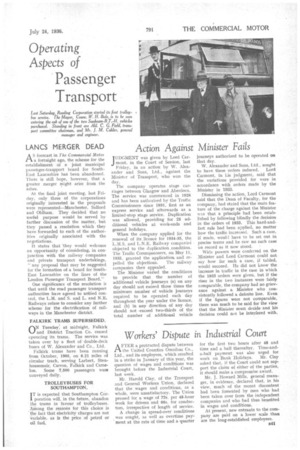Action Against Minister Fails
Page 55

If you've noticed an error in this article please click here to report it so we can fix it.
JTJDGMENT was given by Lord Carmont, in the Court of Session, last Friday,, in an action by W. Alexander and Sons, Ltd., against the Minister of Transport, who won the day.
The company operates stage carriages between Glasgow and Aberdeen. The service was commenced in 1926 and has been authorized by the Traffic Commissioners since 1931, first as an express service and afterwards as a limited-stop stage service. Duplication was allowed, providing for 25 additional vehicles at week-ends and general holidays.
When the company applied for the renewal of its licence for 1934-35, the L.M.S. and L.N.E. Railway companies objected to the duplication ,condition. The Traffic Commissioners, on May 11, 1935, granted the application. and re pelled the objections. The railway companies then appealed.
The Minister varied the conditions to provide that the number of additional vehicle journeys (a) on any day should not exceed three times the minimum number of vehicle journeys required to be operated each day throughout the year under the licence, and (13) in any direction of any day should not exceed two-thirds of the total number of additional vehicle journeys authorized to be operated on that day.
W. Alexander and Sons, Ltd., sought to have these orders reduced. Lord Carmont, in Lis judgment, said that the variations provided for were in accordance with orders made by the Minister in 1933.
Dismissing the action, Lord Carmont said that the Dean of Faculty, for the company, had stated that the main feature of the charge against the Minister was that a principle had been established by following blindly the decision in the orders of 1933. This hard-andfast rule had been applied, no matter how the traffic increased. Such a case, if made, would have to be set out in precise terms and he saw no such case
on record as it now stood.
Wide powers were conferred on the Minister and Lord Carmont could not say how far such a case, if tabled, would succeed. He did not know the increase in traffic in the case in which the 1933 orders were given, but if the rises in the two instances were fairly comparable, the company had no grievance against a Minister who consistently followed a definite line. Even if the figures were not comparable, there was much to he said for the view that the Minister must decide and his decision could not be interfered with.




























































































